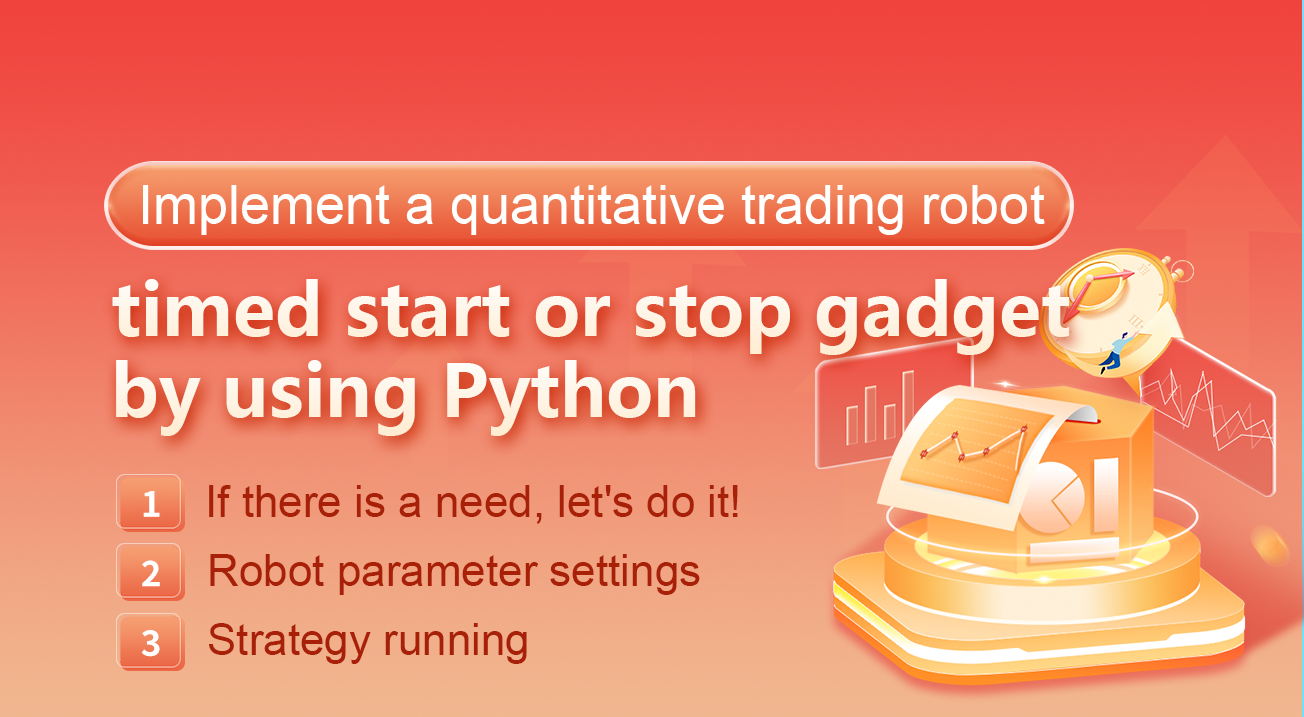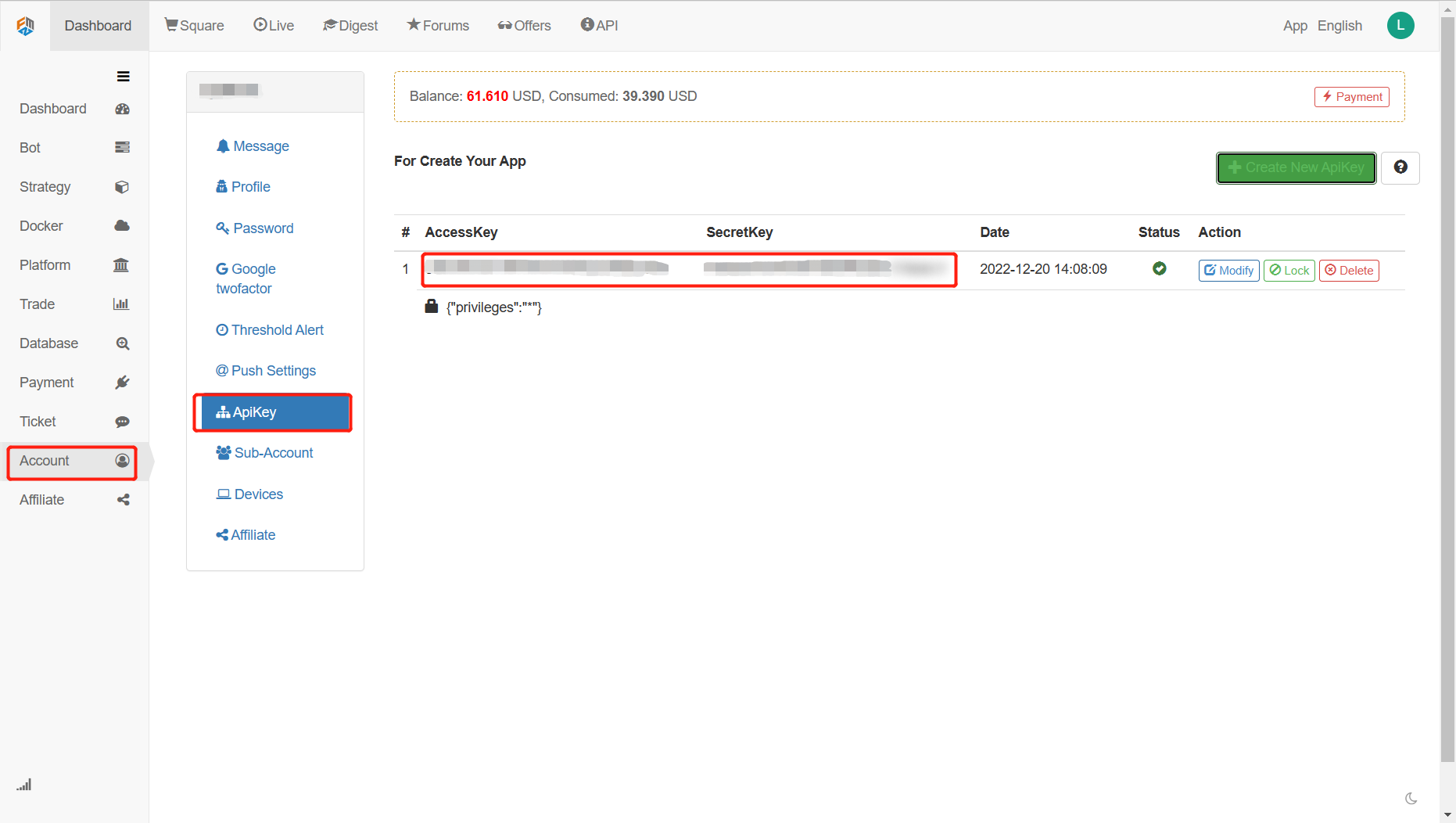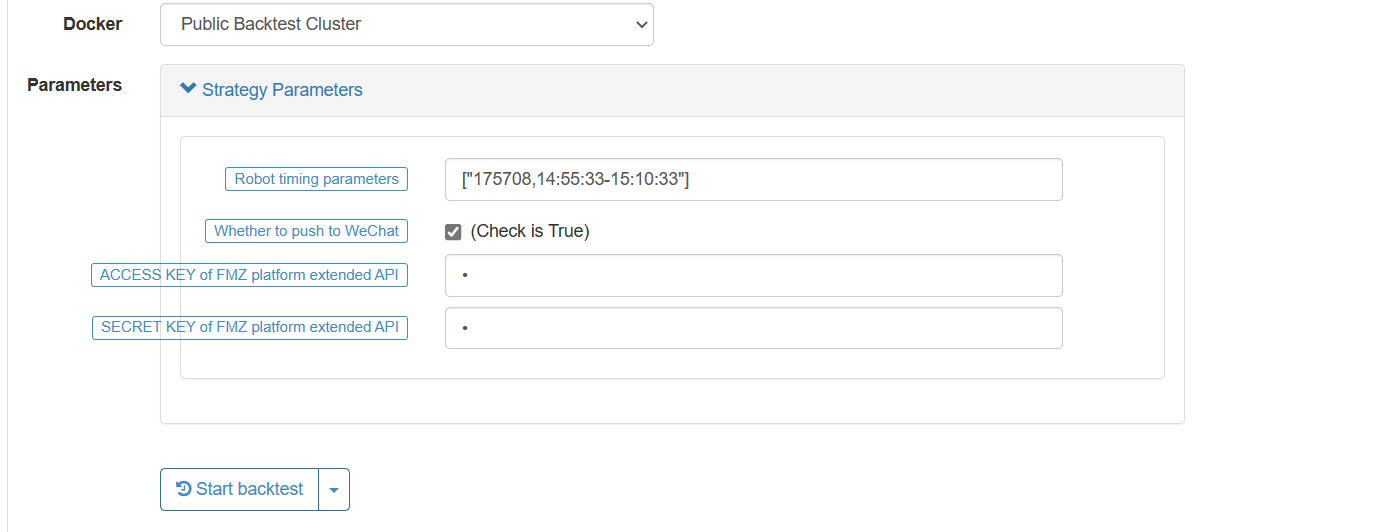Implement a quantitative trading robot timed start or stop gadget by using Python
 0
0
 870
870

Implement a quantitative trading robot timed start or stop gadget by using Python
As a powerful, flexible and easy to use quantitative trading platform for the whole network, the FMZ Quant Trading Platform has very low barriers to use, and the robot program takes up few resources. But we still hope that the robot can start when it needs to run and stop when it doesn’t need to run. For example, the non-opening time accounts for the vast majority of the whole day when conducting program and quantitative trading of commodity futures. In this way, we do hope that the robot will only run at the opening time, and that it will only run at the opening time every day to save money. Isn’t it exciting? To meet this requirement, we can use Python language to write a strategy robot running on the FMZ Quant Trading Platform, and let the robot control the start and stop of the robot at regular intervals through the extended API interface of the FMZ Quant Trading Platform.
If there is a need, let’s do it!
In fact, the whole code is very simple. The example of calling the FMZ Quant Trading Platform extension API interface can be used directly.
Address: https://www.fmz.com/api#simple example
Use the function in the example directly: def api (method, *args)
The interface we need to call is also very simple. The following two interfaces are used (can be found in the FMZ document)
RestartRobot Restart the robot interface and pass in the parameters into the robot ID. Use specific
idto call:api ('RestartRobot', id)StopRobot To stop the robot interface, the parameters are also the robot
ID. RobotID:

To call the FMZ Quant Trading Platform extension API, you need to use the API KEY of the FMZ Quant Trading Platform.
You can generate your own API KEY in account management.
We pass in the API KEY as a strategy parameter.
The screenshot of getting the FMZ Quant Trading Platform account API KEY:

The rest is to write timing logic, which is also very simple. Set timing parameters:
["175708,14:55:33-15:10:33", ...]
The ellipsis indicates that more settings like "175708,14:55:33-15:10:33" can be set.
The timing parameter is a JSON string, which will be parsed into a list in the strategy code. Each element in the list is a set of robot start/stop settings.
Namely:
"175708,14:55:33-15:10:33"
They are separated by commas. The part before the comma 175708 is the robot ID, and the part after the comma is the start time/stop time.
In the above example, the robot with ID 175708 starts at 14:55:33 and stops at 15:10:33.
Then, in the strategy, the robot will keeps rotating. Each round rotation will first obtain the current time, and then judge whether to trigger the start or stop of the robot according to the comparison between the current time and the timing time. If triggered, call the api (‘RestartRobot ‘, id) or api (‘StopRobot’, id) to start and stop the robot.
Complete strategy code:
# -*- coding: utf-8 -*-
import time
import json
try:
import md5
import urllib2
from urllib import urlencode
except:
import hashlib as md5
import urllib.request as urllib2
from urllib.parse import urlencode
def api(method, *args):
d = {
'version': '1.0',
'access_key': accessKey,
'method': method,
'args': json.dumps(list(args)),
'nonce': int(time.time() * 1000),
}
d['sign'] = md5.md5(('%s|%s|%s|%d|%s' % (d['version'], d['method'], d['args'], d['nonce'], secretKey)).encode('utf-8')).hexdigest()
return json.loads(urllib2.urlopen('https://www.fmz.com/api/v1', urlencode(d).encode('utf-8')).read().decode('utf-8'))
RobotParams = json.loads(strRobotParams)
def main():
global RobotParams
arrParams = []
nowDay = 0
strPush = ""
if isPushMsg:
strPush = "@"
for i in range(len(RobotParams)):
param = {}
arr = RobotParams[i].split(",")
if len(arr) != 2:
raise Exception("String configuration error: delimiter,")
param["id"] = arr[0]
param["isProcessOpenThisDay"] = False
param["isProcessCloseThisDay"] = False
arr = arr[1].split("-")
if len(arr) != 2:
raise Exception("String configuration error: delimiter-")
begin = arr[0]
arrBegin = begin.split(":")
if len(arrBegin) != 3:
raise Exception("String configuration error: start time separator:")
param["begin"] = {}
param["begin"]["hour"] = float(arrBegin[0])
param["begin"]["min"] = float(arrBegin[1])
param["begin"]["sec"] = float(arrBegin[2])
end = arr[1]
arrEnd = end.split(":")
if len(arrEnd) != 3:
raise Exception("String configuration error: end time separator:")
param["end"] = {}
param["end"]["hour"] = float(arrEnd[0])
param["end"]["min"] = float(arrEnd[1])
param["end"]["sec"] = float(arrEnd[2])
arrParams.append(param)
# Test
Log("Output parameters", arrParams, "#FF0000")
while True:
nowTime = time.localtime(time.time())
nowHour = nowTime.tm_hour
nowMin = nowTime.tm_min
nowSec = nowTime.tm_sec
tbl = {
"type" : "table",
"title" : "msg",
"cols" : ["id", "begin", "end", "Did you perform a start today", "Did you perform a stop today"],
"rows" : []
}
for i in range(len(arrParams)):
tbl["rows"].append([arrParams[i]["id"], json.dumps(arrParams[i]["begin"]), json.dumps(arrParams[i]["end"]), arrParams[i]["isProcessOpenThisDay"], arrParams[i]["isProcessCloseThisDay"]])
if nowDay != nowTime.tm_mday:
arrParams[i]["isProcessOpenThisDay"] = False
arrParams[i]["isProcessCloseThisDay"] = False
if arrParams[i]["isProcessOpenThisDay"] == False:
if nowTime.tm_hour == arrParams[i]["begin"]["hour"] and nowTime.tm_min >= arrParams[i]["begin"]["min"] and nowTime.tm_sec >= arrParams[i]["begin"]["sec"]:
ret = api('RestartRobot', int(arrParams[i]["id"]))
arrParams[i]["isProcessOpenThisDay"] = True
Log("Robot ID:", arrParams[i]["id"], "Execution started, please log in to the platform to check if it started successfully", "Extended API return value:", ret, strPush)
if arrParams[i]["isProcessCloseThisDay"] == False:
if nowTime.tm_hour == arrParams[i]["end"]["hour"] and nowTime.tm_min >= arrParams[i]["end"]["min"] and nowTime.tm_sec >= arrParams[i]["end"]["sec"]:
ret = api('StopRobot', int(arrParams[i]["id"]))
arrParams[i]["isProcessCloseThisDay"] = True
Log("Robot ID:", arrParams[i]["id"], "Execution stopped, please log in to the platform to check if it stopped successfully", "Extended API return value:", ret, strPush)
if nowDay != nowTime.tm_mday:
nowDay = nowTime.tm_mday
LogStatus(_D(), nowTime, "\n`" + json.dumps(tbl) + "`")
Sleep(500)
Robot parameter settings:

Strategy running:
Screenshots:


Strategy address: https://www.fmz.com/strategy/184600
Ending
As an example, the FMZ Quant Trading Platform’s extended API is still very powerful. It is no problem to build your own quantitative trading platform based on the FMZ platform with these extended APIs. The timing robot is simple in design, it is to start at the time and stop at the time. It does not include mechanisms such as whether the startup is successful, inspection, exception retry, etc. If you are interested, you can add functions and expand them. The strategy is for reference only.
- Teach you to add multi-chart support to the strategy
- Teach you to write a K-line synthesis function in the Python version
- Analysis of Donchian Channel Strategy in the Research Environment
- 当FMZ遇到ChatGPT,记一次使用AI来辅助学习量化交易的尝试
- Off the shelf quantitative trading tool for digital currency options
- Simple grid strategy in Python version
- Linear pending order flow strategy developed based on data playback function
- Strategy for buying the winners of Python version
- FMZ Journey -- with Transition Strategy
- Teach you to transform a Python single-species strategy into a multi-species strategy
- Oak teaches you to use JS to interface with FMZ extended API
- Call Dingding interface to realize robot push message
- Balanced Pending Order Strategy (Teaching Strategy)
- Thoughts on asset movement through contract hedging strategy
- Many years later, you will find this article is the most valuable one in your investment career - find out where the returns and risks come from
- Recent FMZ official charging strategy introduction
- Preliminary Exploration of Python Crawler Application on FMZ Platform -- Crawling the Content of Binance Announcement
- Implementation of Dual Thrust trading algorithm by using Mylanguage on FMZ Quant platform
- Introduction FAQ to Quantitative Trading of Digital Currency
- Another TradingView Signal Execution Strategy Scheme